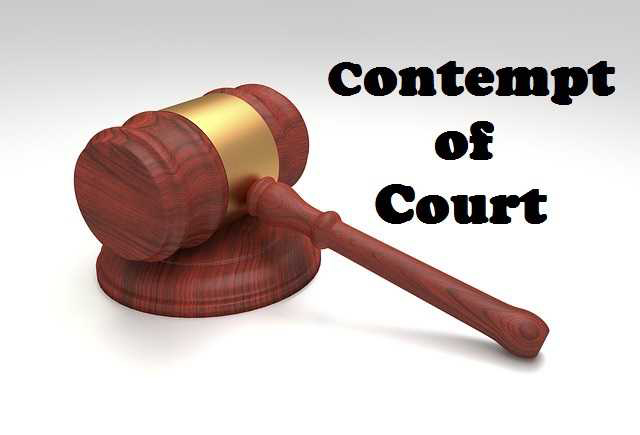
The concept of Contempt is several centuries old. In England, it is a common law principle that seeks to protect the judicial power of the king, initially exercised by him, and later by a panel of judges who acted in his name. Violation of the judges’ orders was considered an insult to the king himself. Gradually any kind of disobedience to judges, or obstruction of the implementation of their directives, or comments and actions that showed disrespect towards them came to be punishable.
Contempt of Court means Civil Contempt or Criminal Contempt;
Section 2(c) in the Contempt of Courts Act, 1971
“Civil Contempt” means willful disobedience to any judgment, decree, direction, order, writ or other process of a court, or willful breach of undertaking given to a court.
“Criminal contempt” means the publication (whether by words, spoken or written, or by signs, or by visible representation, or otherwise) of any matter or the doing of any other act whatsoever which—
- scandalizes or tends to scandalize, or lowers or tends to lower the authority of any court; or
- prejudices, or interferes or tends to interfere with, the due course of any judicial proceeding; or
- interferes or tends to interfere with, or obstructs or tends to obstruct, the administration of justice in any other manner;
Contempt, in law, insult to, interference with, or violation of a sovereign court or legislative body. The concept of contempt is of English origin and is found only in countries that follow the common-law system. The primary importance of the notion of contempt is that it warrants judicial action in defense of the judicial or legislative power itself. Often, the power to enforce a contempt violation is without many of the safeguards that generally restrict the power of the state in the punishment of civil or criminal wrongs.
Contempt of court is an offence of disobedience or disrespect towards a court of law and its officers in the form of conduct that opposes or challenges the authority, justice and dignity of the court. Contempt of Court is a constitutional power vested with the Supreme Court of India.
Article 129 of the Indian Constitution of India states “The Supreme Court of India shall be a court of record and shall have all the powers of such a court including the power to punish for contempt of itself”. Superior courts of record have the powers to punish contempt relating to the judges of those courts and the proceedings therein. The principal aim of the jurisdiction is to protect the dignity of the court and the due administration of justice.
Period of Limitation.
Section 20 deals with period of limitation for initiating contempt proceeding. Section 20 provides that no court shall initiate contempt proceedings either on its own notions or otherwise after the expiry of one year from the date on which contempt is alleged to have been committed. The period of limitation is applicable in Civil as well as Criminal Contempt. Contempt proceedings can be initiated either by filling an application or by the court itself suo moto. In both the cases, contempt proceedings must be initiated within one year from the date on which contempt is alleged to have been committed.
In criminal contempt, contempt is alleged to have been committed the moment scandalization of court or interference with the administration of justice takes place. Consequently, the period of limitation immediately starts running. But, in case of civil contempt the period of limitation does not start from the date of the order. It starts running after expiry of period mentioned in the order after service of certified copy of the order upon the other side. If no time limit is mentioned in the order, the order should be complied within a reasonable period.
It will not be wrong to say that law for criminal contempt gets in conflict with India’s democratic system which recognizes freedom of speech and expression as a fundamental right. In this manner, the judiciary draws resemblance with the executive, in using laws for a chilling effect on freedom of speech.
R. Krishna Iyer, Former Justice of Supreme Court, famously termed the law of contempt as “having a vague and wandering jurisdiction, with uncertain boundaries; contempt law, regardless of the public good, may unwittingly trample upon civil liberties”.
Impact on Subordinate Courts:
- The Constitution allows superior courts to punish for their contempt.
- The Contempt of Court Act also allows the subordinate courts to be punished by High Courts;
Thus, if the definition of contempt is removed, subordinate courts will suffer as there will be no remedy to address cases of their contempt.